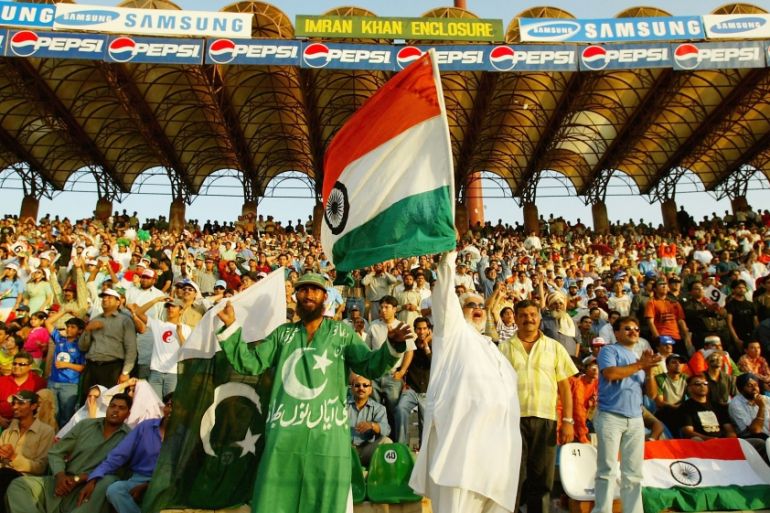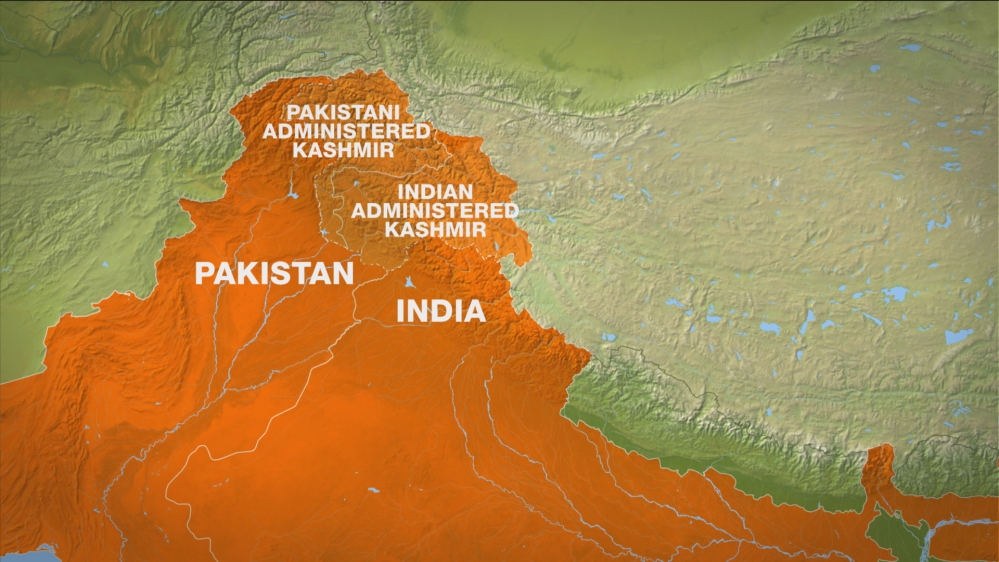Can cricket cool India-Pakistan political hostility?
After a barren spell, Pakistan and India played cricket twice in 14 days. But is renewal of ties on the cards?

London witnessed one of the biggest upsets in the history of international cricket when Pakistan demolished favourites India to win the 2017 Champions Trophy.
Pakistan’s win on Sunday was their first over India since 2014.
Keep reading
list of 4 itemsNew Zealand ease to seven-wicket win over Pakistan to level T20 series
Pakistan and New Zealand T20 abandoned due to rain after two balls
Australia’s Smith joins Washington Freedom before MLC cricket season
But the rivalry, the biggest seen on the cricket field, is positioned against a backdrop of major political hostility between the two countries, at the centre of which is the disputed Kashmir region.
Pakistan and India have fought three wars since gaining independence from British rule in 1947. Two of them have been over Kashmir.
On the cricket field, the two sides have played a total of 194 matches but have been limited since the 2008 Mumbai attack, which India says was orchestrated from inside Pakistan.
The Pakistani team has not toured India for a bilateral series since January 2013 and has not hosted the Indian team for a series since 2006.
The Pakistan Cricket Board (PCB) said it is open for a resumption in bilateral ties, terming cricket an ice-breaker for resumption in diplomacy.
“The PCB would be willing to even send the team to play in India but unfortunately the situation is that the BCCI [Indian cricket board] is not even ready to play with us in their own country, citing security threats,” PCB chairman Shaharyar Khan said.
The BCCI has repeatedly turned down the invitation, citing lack of permission from the Indian government.
There have also been suggestions from the Indian side that there is reluctance to improve ties.
Earlier this month, the owner of Zee Media, one of the most popular media networks in India, announced a boycott of the India-Pakistan match. On Saturday, Amit Shah, president of India’s BJP party, ruled out the two sides playing on each other’s soil.
Zee News, Zee Hindustan, WION, DNA and all other news channels from Zee Media will not be covering any news about India Pak match
— Subhash Chandra (@subhashchandra) June 4, 2017
“India cannot consider playing a bilateral series with Pakistan as long as it supports terrorism and creates trouble in Kashmir,” Youth Affairs and Sports Minister Vijay Goel said.
“We have clearly stated terrorism and sports cannot go side by side. As long as Pakistan does not stop cross-border terror and it creates trouble in Kashmir, there is no chance for a bilateral series, the national mood also does not support it.”
Analysts hoping for resumption of ties on and off the field argue that the Indian government’s stance has resulted in not only fans being robbed of seeing their idols in action but also the sport being held hostage.
But would a movement on the cricket pitch force a shift of ties on the government level?
I think we should play cricket and other sports too. If we put off all sporting ties until we solve our problems, that wouldn’t be wise
Mukul Kesavan, an Indian historian and novelist, believes there is no link.
“There was a time when cricket between India and Pakistan bulked so large it seemed to have constituted the whole relationship,” Kesavan told Al Jazeera.
“There is no chance of a bilateral series taking place any time soon. Indian politics, over the last year or so, has become so centred on what is taking place on its borders with Pakistan, it seems the government will trivialise the soldiers’ martyrdom if it allows the team to play Pakistan on either side of the border.
“When we play our ultimate enemy at sports voluntarily, it seems as if we stand to demean the soldiers. This is the DNA that the state approves.”
The buildup to any Pakistan-India match is visibly marked by special programmes on news channels. Politicians become cricket experts overnight and the game is thought to be won from the strategies marked in the studio.
In addition to that, there is Twitter.
PCB. Cricket team bhejna please.Earlier Hockey ya Kho Kho team bhejin thin. Kyon ki 18th June(Fathers Day) Baap khel raha tumhare saath lol!
— Rishi Kapoor (@chintskap) June 15, 2017
Translation: PCB: Please send a cricket team. You sent a hockey or kho kho team earlier. On June 18 (Father’s Day), you will be taking on your father.
Well tried Pote. Great effort to reach semis.Ghar ki hi baat hai.
Father's Day par Bete ke saath final hai. Mazaak ko serious mat liyo bete.— Virender Sehwag (@virendersehwag) June 15, 2017
Translation: Well tried, grandson [Bangladesh]. Great effort to reach semis. It’s a household thing. We’re taking on our son on Father’s Day. Don’t take our joke seriously, son.
“Sometimes we make cricket too important,” Kesavan added. “Cricket will always be an important symbol kicked about one way or another. In the end, it doesn’t make the weather anymore.”
There are frequent exchanges of fire across the Line of Control, the de facto border dividing the Kashmir valley. India accuses Pakistan of backing separatist fighters in the Himalayan region, a charge Pakistan denies.
Pakistani flags are often witnessed on the streets of Kashmir, mostly as a taunting tool against Indian soldiers. A Pakistan win comes with severe consequences in Indian-administered Kashmir. Celebration is often met with retaliation from security forces.
A few cricketers not known for keeping their cool on the field also choose to get involved.
Fireworks all around, feels like an early Eid here. Better team took the day. Congratulations team #Pakistan
— Mirwaiz Umar Farooq (@MirwaizKashmir) June 18, 2017
A suggestion @MirwaizKashmir why don't u cross the border? U will get better fireworks (Chinese?), Eid celebs there.I can help u wid packing
— Gautam Gambhir (@GautamGambhir) June 18, 2017
Earlier this week, Indian police arrested 15 Muslim men and charged them with sedition – punishable by life in prison – for celebrating Pakistan’s win over India in the final. The charge was later dropped.
Last year, 21-year-old Ripon Chowdhry was arrested in Assam state for wearing a T-shirt bearing the name of former Pakistan captain Shahid Afridi. In addition, around 60 students were arrested on sedition charges in India in 2014.
A Pakistani man was arrested in 2016 for waving an Indian flag after Indian batsman Virat Kohli scored a match-winning 90.
Is cricket enough?
But even if Pakistan and India do resume ties across the border, “the goodwill that emerges from a cricket match will not be enough to chip away at the underlying and age-old tensions that keep India-Pakistan relations on tenterhooks”, according to Michael Kugelman, deputy director of the Asia Program at The Wilson Center.
“There’s something about sports that allows us to bring our guard down and happily interact even with our most bitter rivals,” Kugelman told Al Jazeera.
“All this said, I don’t think we should overstate the power of sports to reduce tension. Sports can serve as a sanctuary from geopolitical tensions, but only to an extent.
“Cricket won’t magically enable the Kashmir dispute to be resolved, or to make cross-border terrorism go away.”
The “enormous” trust gap, added Kugelman, was too wide to be bridged by a cricket match and it was diplomacy on the government level that was needed to solve the issues.
